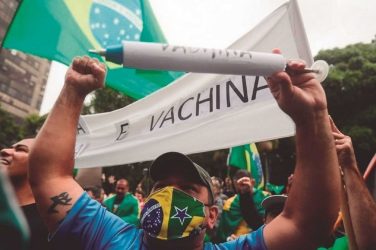 The good news for Brazil is that it appears as if the PT or Workers Party of Brazilian President Luiz Inácio Lula da Silva has failed in its attempt to establish a totalitarian government through democratic means.
The good news for Brazil is that it appears as if the PT or Workers Party of Brazilian President Luiz Inácio Lula da Silva has failed in its attempt to establish a totalitarian government through democratic means.
More than a year ago, when it became evident that the society would not accept such measures, the PT led government was forced to scuttle proposed measures, that by controlling the Federal Counsel of Journalism would have amounted to censorship of the press, TV and the movies.
The current ongoing exposure of the Workers Party’s organized schemes to funnel funds skimmed from government owned companies and agencies into party coffers has diminished the PT’s power. No longer can the PT portray itself as the champion of propriety and morality.
The charade is over. The Brazilian population now knows that either Lula willingly participated in and condoned these maneuvers or was unaware of what was going on around him. Thus far, in an effort to preserve institutional stability, the latter hypothesis prevails in most quarters.
Soon Brazilians must decide whether they have a blatantly dishonest man as their President or merely a grossly incompetent leader, a phenomenon that is not a novelty.
Accusations by Roberto Jefferson, the former president of the PTB party that at times supported the government, have led to a series of denials by the top executives of the Workers Party and their resignations as well the previous downfall of Lula’s Chief of Staff and the former president of the PT, José Dirceu.
Lula has handled the situation badly. He professes to want to investigate thoroughly and punish those found guilty of corruption in the Post Office, the Reinsurance Agency and the bribing of congressmen. But Lula’s PT acts contrarily to his statements.
The PT has attempted to block congressional investigations with limited success. The PT claims that all this fuss is a diabolical plan of the “elite” to destabilize the government and cause a coup.
Nothing could be farther from the truth, as few would want the military back in charge. Nor does the public want to go through another impeachment procedure, which would be more complicated than that of 1992 that resulted in the resignation of President Fernando Collor de Mello.
The banks have never had such favorable earnings and business has not been all that bad during Lula’s tenure. The population would be content to have a relatively competent and honest government working for the benefit of its citizenry.
The bad news is that many educated people that voted for Lula in his fourth attempt to become president feel that they have been let down. Some sincerely felt that Lula would be able to change things for the better. Few of his campaign promises have materialized.
In spite of this recent crisis, Lula’s popularity among the masses remained intact, due to able marketing and the fact that Lula rose up from a metal worker with a third grade education to become president.
The most recent poll shows that Lula would be reelected against all of the now obvious opposition candidates. Things can change in the next months prior to the November 2006 presidential elections though.
Unlike many Brazilians from poor illiterate families Lula never pursued education preferring to become a labor leader. He and his fellow Workers Party comrades clearly enjoy the trappings that come with power.
This is not unnoticed to even the most ill informed populace. Brazil spends more to maintain the President that Great Britain does to keep the royal family.
Efforts to gloss over the current political crisis by rousing the extremist groups that have traditionally supported the PT have failed for the most part.
It is difficult for leaders such as José Dirceu, who enjoys his tailor made suits, Cuban cigars, dining in top restaurants and drinking fine wines, to incite conflict among the social classes.
As Lincoln once said, “You can fool some of the people all of the time and all of the people some of the time but you can’t fool all of the people all of the time.”
The PT in its current configuration may soon be finished as a major political voice. It is badly disheveled, divided and has lost credibility. Lula has let go of three of his ministers who are now trying to resurrect the Workers Party.
It is still too early to predict how all of this will play out. The press is vigilant in its efforts to uncover wrongdoings. Even the federal police, controlled by the federal government, has contributed to the exposure of those indulging in unethical and illegal practices.
Lula has attempted to gain support from the PMDB, an amorphous group of politicians that possesses a large number of senators and deputies.
The PMDB, which has been awarded more ministries, is also divided among those who do not wish to be seen as supporting a weak and scandal-ridden government and those who are willing to attempt to enjoy the spoils that come with key posts.
In spite of all this political intrigue, the nation’s credit rating remains positive. The macro economic figures look favorable. Exports are at record levels.
The external borrowing requirements for 2005 have already been met and the authorities are now looking to issue more bonds while the market is still inclined to buy them to provide a cushion for 2006.
Relatively high yields are the main attraction yet the stellar performance of finance minister Antonio Palocci and his staff obviously influences decision makers. A recent very positive cover story in the European edition of “Newsweek” magazine adds to his credibility.
With the demise of José Dirceu, who previously had Lula’s ear, Palocci along with the reasonable Minister of Justice, Márcio Thomaz Bastos, are now Lula’s closest advisors along with Dilma Rousseff, former energy minister who replaced José Dirceu as Lula’s Chief of Staff.
Lula has announced further cabinet changes that he has procrastinated for months until the recent crisis made it imperative that he do something. Quite possibly now will be the time for central bank president Henrique Meirelles to quietly step down.
He claims that he will run for office next year without stating what office or which party he will use. Meirelles departure, which has been anticipated for weeks, would hardly raise an eyebrow with all the other mischief that is being uncovered.
The economy has displayed signs of slowing down. Part of this may be due to the political crisis that leaves people concerned about the future. Sky-high real interest rates and excessive taxation do not help encourage investment.
With congress busy with investigations and trying to protect itself, it is highly unlikely that any significant legislation will be enacted in the near term future.
The reforms of labor legislation, unions, and of the political system itself will be gathering dust. Thus far congress has made no efforts to draft new rules merely taking what the executive branch hands them.
As it becomes increasingly obvious that Brasília is nearly rotten to the core, the population may become even more cynical about elected officials and the chances of punishment of those involved in unethical, illegal and immoral practices.
July is a school holiday month and people are concerned about their vacations in the mountains, at the shore, in the interior or abroad.
Lula is currently celebrating Bastille Day in Paris, buying 12 used Mirage fighter planes and participating in cultural events pertaining the Brazil Year in France. But August, traditionally a month of political turmoil, will soon be with us.
In spite of several past promises, the military has yet to receive its pay increase and wives of the soldiers and sailors have protested in the capital. Military leaders, as well as the responsible opposition have been quiet waiting to see what happens.
The armed forces are not happy about their compensation, particularly now in view of all the publicity about ill begotten cash that has been used to help support the various causes of the Workers Party.
August could be a crucial month for Lula and the nation. Should vice president José Alencar wind up as president, the possibilities that the rigid fiscal and monetary policies might be loosened will increase. He has frequently criticized Palocci’s high interest rates.
Richard Edward Hayes first came to Brazil in 1964 as an employee of Chase Manhattan Bank. Since then, Hayes has worked directly and as an advisor for a number of Brazilian and international banks and companies. Currently he is a free lance consultant and can be contacted at 192louvre@uol.com.br.







